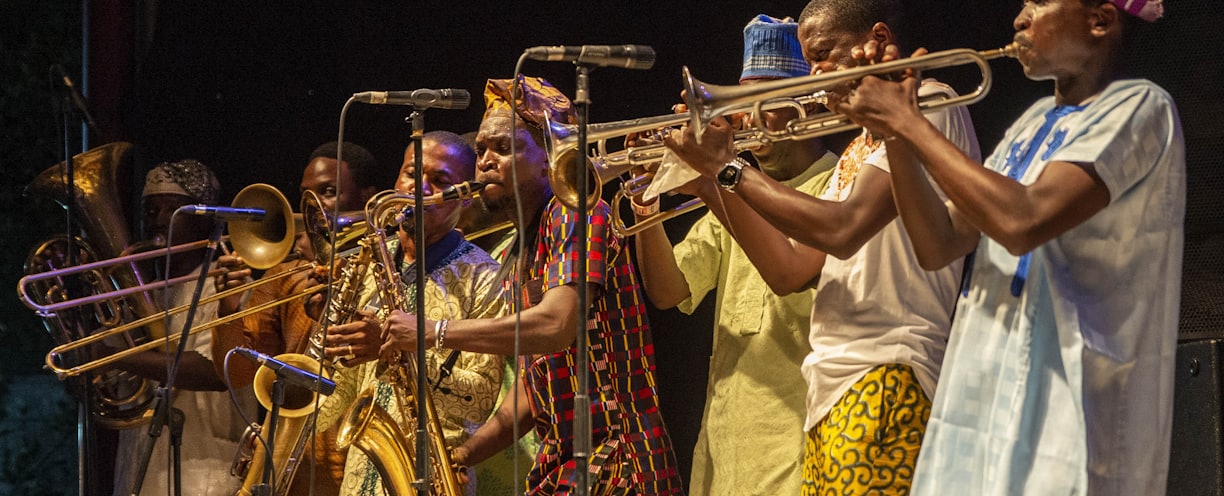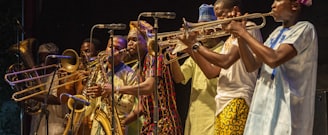Fela Kuti - the most persecuted musician in history
Fela Kuti, arguably one of the biggest names in the pioneering African Music scene, is also revered as the most persecuted musician in history. He was arrested over 200 times and made to appear in court 356 times for criticizing the corrupt activities of the Nigerian military regime. Fela Aníkúlápó Kuti, also known as Abami Eda, was a Nigerian multi-instrumentalist, bandleader, composer, political activist, and Pan-Africanist. He is regarded as the pioneer of Afrobeat, an African music genre that combines traditional Yoruba percussion and vocal styles with American funk and jazz. At the height of his popularity, he was referred to as one of Africa's most "challenging and charismatic music performers".
AFRICAN HISTORYMAZU


Fela Kuti, arguably one of the biggest names in the pioneering African Music scene, is also revered as the most persecuted musician in history. He was arrested over 200 times and made to appear in court 356 times for criticizing the corrupt activities of the Nigerian military regime. Fela Aníkúlápó Kuti, also known as Abami Eda, was a Nigerian multi-instrumentalist, bandleader, composer, political activist, and Pan-Africanist. He is regarded as the pioneer of Afrobeat, an African music genre that combines traditional Yoruba percussion and vocal styles with American funk and jazz. At the height of his popularity, he was referred to as one of Africa's most "challenging and charismatic music performers".
Olufela Olusegun Oludotun Ransome-Kuti was born into the Ransome-Kuti family, an upper-middle-class Nigerian family, on 15 October 1938 in Abeokuta (the modern-day capital of Ogun State), which at the time was a city in the British Colony of Nigeria. His mother, Chief Funmilayo Ransome-Kuti, was an anti-colonial feminist, and his father, Reverend Israel Oludotun Ransome-Kuti, was an Anglican minister, school principal, and the first president of the Nigeria Union of Teachers.
Kuti attended Abeokuta Grammar School. In 1958, he was sent to London to study medicine but decided to study music instead at the Trinity College of Music, with the trumpet being his preferred instrument. While there, he formed the band Koola Lobitos and played a fusion of jazz and highlife. While in London, he encountered various musical styles by playing piano in jazz and rock bands. Returning to Nigeria in the mid-1960s, he reconstituted Koola Lobitos, a band with which he had played in London. The Afro-beat sound emerged from that group’s experiments.
Following his 1969 tour of the United States, where he was influenced by the politics of Malcolm X, the Black Panthers, and other militants, Kuti’s music became increasingly politicized. He exhorted social change in such songs as “Zombie,” “Monkey Banana,” “Beasts of No Nation,” and “Upside Down.” Fela (as he was popularly known) and his band, which was known variously as the Nigeria 70, Africa 70, and later the Egypt 80, performed for packed houses at the early-morning concerts that they staged at Fela’s often-raided nightclub in Lagos.
The firebrand singer, who gyrated over the keyboard as he sang in English and Yoruba, struck a chord among the unemployed, disadvantaged, and oppressed. His politically charged songs, which decried oppression by Nigeria’s military government, prompted authorities to routinely raid his club, looking for reasons to jail him. Near there he also set up a communal compound, which he proclaimed the independent Kalakuta Republic. As head of the commune, he often provoked controversy and attracted attention by promoting indulgence in sex, polygamy (he married 27 women), and drugs, especially marijuana. A 1977 raid on the complex by Nigerian authorities resulted in his brief incarceration and the death of his mother the following year due to complications from a fall. In exile in Ghana in 1978, he changed his name from Ransome to the tribal Anikulapo.
In 1979 Fela formed a political party, the Movement of the People, and ran unsuccessfully for the presidency of Nigeria. Five years later he was jailed for 20 months on charges of currency smuggling. Upon his release, he turned away from active political protest and left his son, Femi, to carry the torch of Afro-beat music. Fela was jailed again in 1993 for murder, but the charges were eventually dropped. He died as a result of complications from AIDS.
